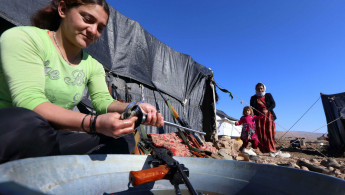International Women's Day Special Coverage
Across the globe, advances have been made in those 20 years. But the picture in the Arab region is not good. The proliferation of dogmatically conservative forces and military dictatorships almost by definition victimises women.
The many conflicts in the region only exacerbate that situation. Wars encourage violence against women. And even if the violence is not directed at them, many women have been left sole family breadwinners, their husbands and sons either away fighting, killed or imprisoned.
All this in societies where opportunities are limited. Even without the violence tearing at the region, Arab countries have a long way to go before achieving anything close to gender equality.
Unequal legislation, social and religious restrictions and political obstacles blight the advance of women’s rights throughout the region.
Al-Araby al-Jadeed has taken a snapshot of the situation of Arab women across the region, as well as profiling some of those outside. We’ve tried to include profiles of women who’ve bucked whatever trends and difficulties they’ve encountered.
Some are artists, like Lebanon-based Carol Mansour - here profiled by Lana Asfour, whose films document stories that might otherwise not be heard. Some are politicians, like the British-Palestinian Liberal Democrat from Oxford bidding to become a member of the British parliament.
We’ve also collected the tales of those who live in the shadow of war, whether they are Syrian refugees in Lebanon or mothers in Gaza. We try to shine a light on the suffering of female prisoners in Syria.
There are the many women of the Egyptian revolution whose bravery has been snuffed out for now as the military took back control of the country.
There have been advances. In 12 years, Morocco has gone from an eight percent gender difference in primary school enrolment to near parity. Algeria has made similar strides.
Tunisia has a greater proportion of female parliamentarians than either France or Britain, as Sandro Lutyens notes in a profile of one of these, Ennahdha’s Sayyida Ounissa.
But Saudi Arabia still does not allow its women to drive, proving more conservative than even the Islamic State group, which has its own female police force. Still Saudi women continue the struggle.
The United Nations used to run a campaign for gender equality that had as its tag line: “Women’s rights are human rights”. But, as one late lamented Arab intellectual once noted, there can be no advance in women’s rights without an advance in rights generally.
Open democratic societies offer the best chance of advancing women’s rights precisely because they advocate citizens’ rights for all and equality before the law. It is no surprise then, that the angry counter-revolutionary wave that has devastated the region in response to the Arab Spring has led many to conclude that the struggle for gender parity has gone back to year zero.



